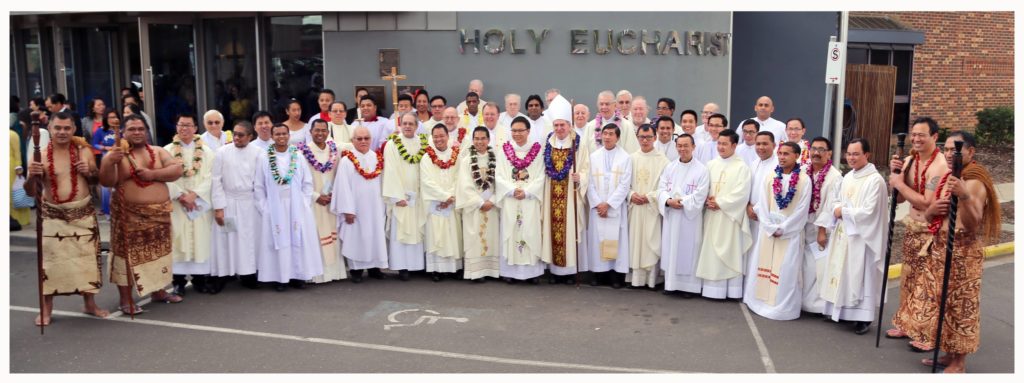In the language of human affairs, mercy is a foreign word. Revenge, punishment and a ruthless exposure of wrongs set the tone. There is no mercy for the guilty. Human relationships shrink to accusation, suspicion and resentment. Police and prison officers, lawyers and judges, all make sure the system of fitting penalties and compensation keeps working.
In that “real world”, mercy is not only a foreign word, but a dangerous idea. Some think it means mindless indulgence. But there is no mercy in a society pretending that everything is “all right” in the conduct of its citizens. It is cruelty, not mercy, if parents don’t call their children to account for bad behaviour. Mercy makes demands. Society would collapse if there were no laws, no law-enforcement agencies, and no courts of appeal. Without rules, traffic would become too dangerous and be forced to stop.
Pope Francis’ Jubilee Year of Mercy makes us look more honestly and deeply at the world and our role in shaping it. If mercy is to mean something, four points must be considered.
First, the biggest of all and the most radical is what we believe about God. You can imagine how difficult it would be to have any idea of mercy if we thought of God as a long way away, always sitting in judgment on us, and out to get us in our weakness and failures. A moment’s thought shows how blasphemous that would be. Out of sheer love God has called each one of us into existence. He has so loved us and our world as to give his beloved Son to show us his true face of the Father through Jesus’ words of forgiveness and his works of healing.
As he died on the cross, he prayed, “Father, forgive them for they do not know what they are doing” (Luke 23:34). His death led to the joy of the resurrection in which we all can share. Against that background, Jesus says to us, “Be merciful as your heavenly Father is merciful” (Luke 6:36). He taught his followers to pray that demanding prayer, “Father forgive us our trespasses as we forgive those who trespass against us”. God is, indeed, “the Father of mercies” (2 Corinthians 1:3)
“The idea of mercy seems strangely out of place in a culture that has taught us never to admit failure or guilt and to hide behind a carefully cultivated image. As a result, we bear the burden of living a lie.”
Secondly, the idea of mercy seems strangely out of place in a culture that has taught us never to admit failure or guilt and to hide behind a carefully cultivated image. As a result, we bear the burden of living a lie. We must keep up the pretence of being blameless. We never dare to admit the coldness of our hearts, and the seven deadly sins that swarm there — pride, covetous, lust, anger, gluttony, envy and sloth. The more loving and holy they are, the more saints are ready to confess their sins and the need for mercy. If however, we have become frozen and self-defensive, incapable of admitting our own wrong-doing, mercy is a word in a foreign language, and an attitude belonging to another world. But in God’s world, we can agree with St Paul, “Where increased grace abounded all the more” (Romans 5:20).
Thirdly, in our Christian understanding, to receive mercy means becoming merciful: “Be  merciful as your heavenly Father is merciful” (Luke 6:36). There is no hint of manipulating God and leaving our world and our hearts unchanged: “blessed are the merciful for they will receive mercy” (Matthew 5:7). Surrendering to the loving mercy of God means becoming a source of mercy to others. In other words, mercy received must result in mercy shown to others. In the spiritual and corporal “works of mercy”—all the way from praying for others, instructing and counselling them when needed, visiting the sick, helping the poor and welcoming the stranger, and being a peacemaker. Without doing mercy we cannot receive it, and expect to belong to the kingdom of God.
merciful as your heavenly Father is merciful” (Luke 6:36). There is no hint of manipulating God and leaving our world and our hearts unchanged: “blessed are the merciful for they will receive mercy” (Matthew 5:7). Surrendering to the loving mercy of God means becoming a source of mercy to others. In other words, mercy received must result in mercy shown to others. In the spiritual and corporal “works of mercy”—all the way from praying for others, instructing and counselling them when needed, visiting the sick, helping the poor and welcoming the stranger, and being a peacemaker. Without doing mercy we cannot receive it, and expect to belong to the kingdom of God.
There is a fourth point. As the saying goes, “the truth hurts”. It does — especially when it appears that we are less than the self-image we have carefully constructed. Selfishness, a hard-hearted rejection of others, jealously and spite, all make us spiritually ugly. Being found out, therefore, is humbling. Although the truth hurts, in world of God-given mercy, the whole truth is a source of healing and hope. In that world, we are all more than our failures. The love and mercy of God is the whole truth leading us on, offering new life. St Paul can even boast of his weaknesses “so that the power of Christ may dwell in me … for whenever I am weak then I am strong” (2 Corinthians 12:9).
“Each one of us is wrapped in the boundless mercy of God, and is empowered to bring that mercy to others”
 Lastly, acting mercifully to others is entering into the heart of God and doing what God is doing in the world. It is living in the Sacred Heart. There, each one of us is wrapped in the boundless mercy of God, and is empowered to bring that mercy to others. United with Christ in this way, we begin to share in Jesus’ reaction to hatred, violence, and dishonesty. Sharing in this mercy, we are not destroyed by the evils we encounter in ourselves and our world. Rather than becoming harsh and bitter, we each grow more fully as agents of mercy and forgiveness in the world. Each Christian life is a heartbeat in the heart of God and a pulse in the circulation of the life of Christ. The Year of Mercy is a summons into the life of mercy, as it overflows from God, through Christ and into the world.
Lastly, acting mercifully to others is entering into the heart of God and doing what God is doing in the world. It is living in the Sacred Heart. There, each one of us is wrapped in the boundless mercy of God, and is empowered to bring that mercy to others. United with Christ in this way, we begin to share in Jesus’ reaction to hatred, violence, and dishonesty. Sharing in this mercy, we are not destroyed by the evils we encounter in ourselves and our world. Rather than becoming harsh and bitter, we each grow more fully as agents of mercy and forgiveness in the world. Each Christian life is a heartbeat in the heart of God and a pulse in the circulation of the life of Christ. The Year of Mercy is a summons into the life of mercy, as it overflows from God, through Christ and into the world.
Let St Paul sum it up, “be kind to one another, tender-hearted and forgiving one another, as God in Christ has forgiven you” (Ephesians 4:32).
(from: http://www.cssr.org.au/)








